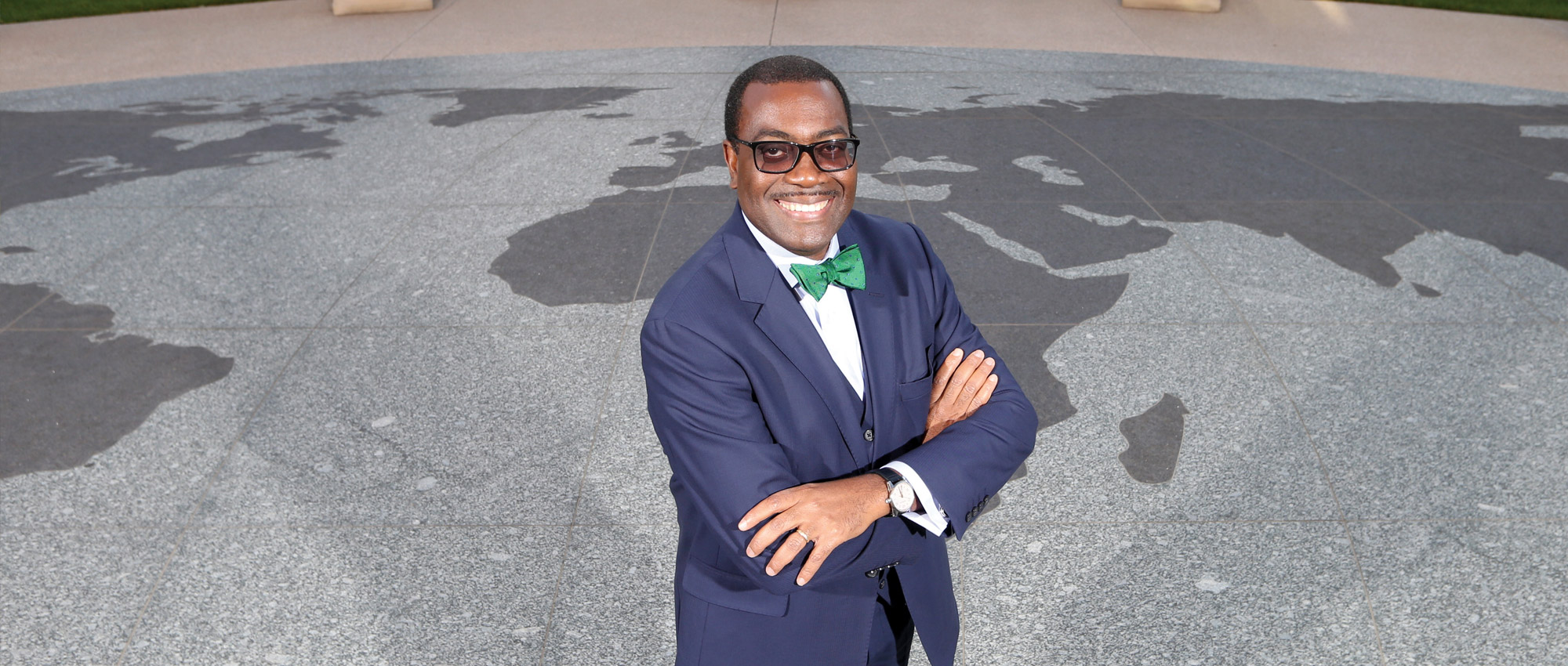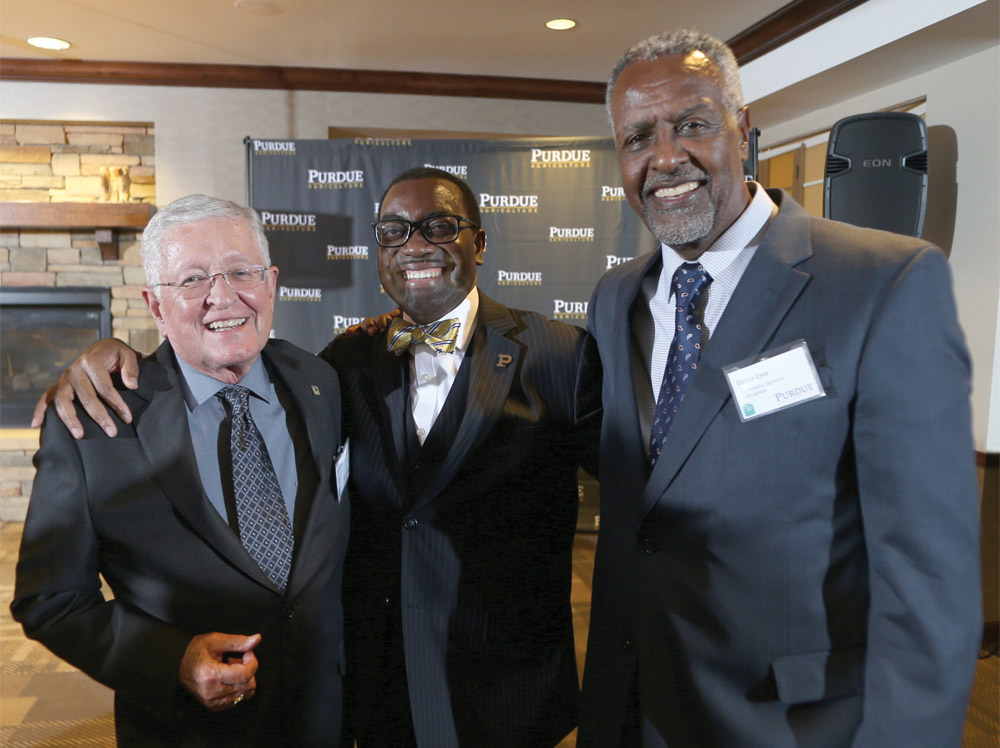
Alumni Close-up
Story by Maureen Manier
Eye on the Prize
In the grand chamber of the Iowa State Capitol, filled with former ambassadors, cabinet secretaries, and leaders of nations, global organizations, industry, and universities, the rhythmic drumming and voices of the Nigerian group Adunni & Nefertiti began. Within seconds, the 2017 World Food Prize Laureate Akinwumi Ayodeji Adesina rose to his feet and gently matched the rhythms. He extended a hand to his wife Grace, dressed in the vivid green of the Nigerian flag that matched his bowtie. Soon, 80-year-old former Nigerian President Olusegun Obasanjo was dancing with the Adesinas, celebrating the joy of their journey.
Adesina began his journey sleeping on a mat next to three brothers in their one-room home, a house without electricity or plumbing in Ibadan, Nigeria. His father and grandfather worked as farm laborers. His father, Roland, learned how to read at age 14, and was able to obtain an education and a civil service job that provided the means to change his sons’ lives. Roland sent his sons to the local village rather than the city school because he wanted them to understand the poverty experienced by smallholder farmers. That lesson stayed with Adesina, who attended the University of Ife in Nigeria and then Purdue University’s College of Agriculture, where he earned master’s (’85) and doctoral degrees (’88) in agricultural economics. He applied, he explains, after a professor at Ife told him that he didn’t have the intelligence to succeed at Purdue. “After class, I went to the library, looked up Purdue, and applied,” says Adesina. “I thrived and won the Outstanding PhD Thesis Merit Award.”
Adesina’s early months at Purdue, however, were anything but easy. He remembers a day when he had only 25 cents left . He shared his situation with Professor John Connor, who immediately loaned him $100. That same day, Professor Phil Abbott gave Adesina an assistantship, which provided enough to pay monthly bills. From that moment on, Adesina says his years at Purdue were all about classes, exams, and his church, Upper Room Christian Fellowship, where he delivered a sermon during his recent visit to Purdue.
"If I hadn’t been given the opportunities I received from Purdue, I wouldn’t be where I am today."
Adesina credits his wife Grace for giving up her career to support their family. Charting a decade of frequent moves after they left Purdue, it’s clear why. Adesina first accepted a post-doctoral fellowship with The Rockefeller Foundation, which began a decade within the Consultative Group for International Agricultural Research (CGIAR) system. That work took him to India, Mali, Côte d’Ivoire, New York City, and, ultimately, back to Nigeria.
While at The Rockefeller Foundation, Adesina organized the 2006 Africa Fertilizer Summit. There, Nobel Peace Prize winner Norman Borlaug, who later founded the World Food Prize, challenged African presidents and leaders to help Africa feed its hungry by increasing crop yields. The energy from that conference led to the founding of the Alliance for a Green Revolution in Africa, and, as vice president, Adesina oversaw a major expansion of commercial bank lending to farmers.
Adesina implemented one of his trademark initiatives during his tenure as the Minister of Agriculture in Nigeria. Using an electronic wallet system, this venture eliminated in just 90 days the corruption that had dominated the country’s fertilizer distribution system for 40 years by providing farmers direct access to subsidies using their mobile phones. Under his leadership, Nigeria’s production expanded by 21 million metric tons, and it received $5.6 billion in private-sector investments in agriculture.

Purdue World Food Prize Laureates greet one another at
the award ceremony: (l to r) Philip Nelson, professor
emeritus; Akinwumi Ayodeji Adesina, president of the African
Development Bank Group; and Gebisa Ejeta, distinguished
professor of agronomy
In 2015, Adesina was elected president of the African Development Bank Group, which seeks to spur economic development and social progress in its regional member countries. In this role, Adesina often reflects on the challenge Norman Borlaug made to him: “Akin, go score some goals for African agriculture!” Adesina’s vision for Africa is to win the game, capitalizing on natural resources. “There is a lot of land, cheap labor and lots of water,” he says. “Sixty-five percent of the world’s uncultivated land is in Africa. I know Africa can feed itself in 10 years and also help to feed the world.”
Adesina has received much recognition for his unfailing effort to achieve this vision, including a 2015 honorary doctorate from Purdue, the Yara Prize for the African Green Revolution, and the 2013 Forbes Africa Person of the Year. But he knew the World Food Prize honor would accelerate the change to which he’s devoted his life. “I felt personally elated by the recognition of 25 years of working to lift people out of poverty. Then, I realized that this prize would mean so much more. I feel the World Food Prize provides wind behind my sails in my passion for Africa to feed itself.”
Adesina committed his $250,000 award to create the World Food Prize Institute, which will support young African agricultural entrepreneurs, scientists, and scholars. Within a day after his announcement, Adesina’s gift had inspired an additional $300,000 in donations. His goal is to make young people excited about agriculture, “Nothing is more important to me than helping young people,” he says. “If I hadn’t been given the opportunities I received from Purdue, I wouldn’t be where I am today.”
Photos provided by Tom Campbell.